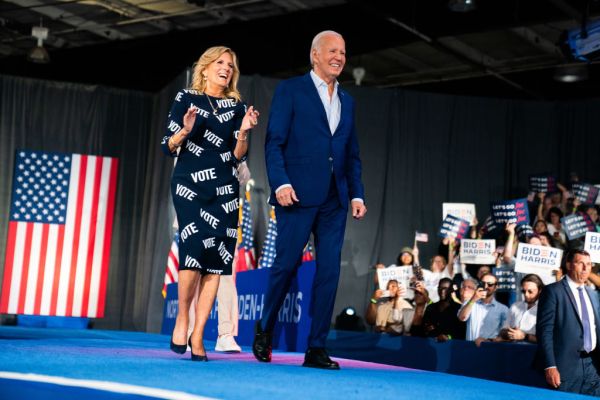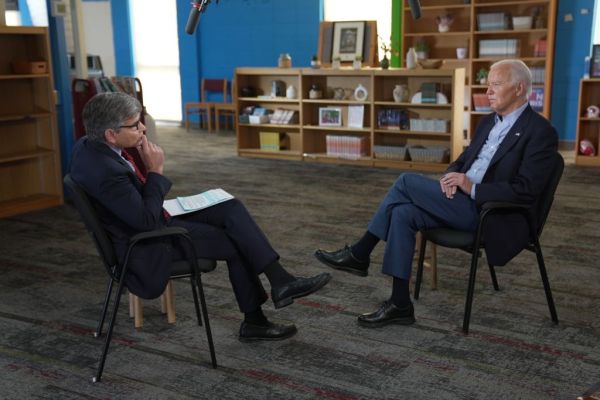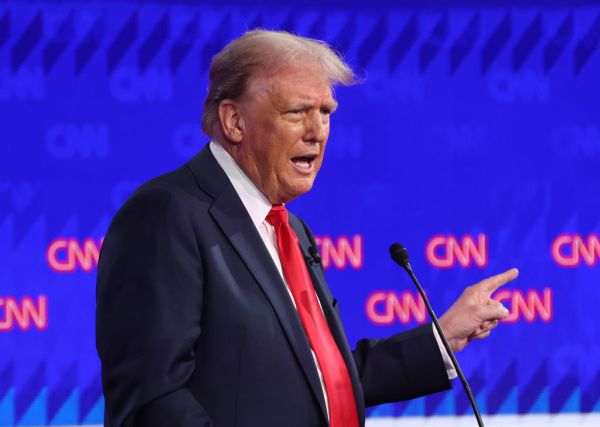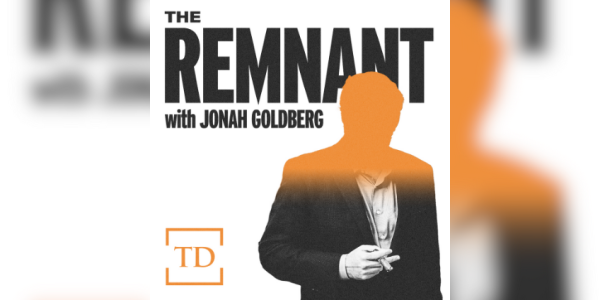Joe Biden’s debate disaster is an unusual political “scandal” in that there’s something new to feel demoralized about with each passing day.
First came the shock of realizing that the president is far more impaired than anyone outside of his inner circle seemed to know. Then came rage at the fraud perpetrated by that inner circle on Democratic primary voters and the wider public about his health. Then came horror at watching Biden threaten to blow up his party if it refused to nominate him, even as his polling weakened and the odds of an unthinkable second Trump presidency soared.
The next emotional stage is smoldering contempt for cowardly Democrats who refuse to do everything possible to try to avert a civic catastrophe in November.
On Tuesday, NBC News reported that party apparatchiks feel “powerless” to resist the president as he asserts his right to lead Democrats to defeat this fall. One state party chair was surprisingly blunt about the problem: “I wish I was more brave,” he told the outlet, but “I would be crucified by [Democratic leaders] if I spoke out of line.”
An unnamed House Democrat rationalized his own fear of speaking out by wondering what good it would do. “I could say something, but I’m a pragmatist,” he told NBC News. “Would it have any effect? Would it have any impact? I think in the absence of leadership stepping forward—I don’t think any rank-and-file member is going to change that dynamic.”
By Tuesday evening, paralyzed liberals allegedly had taken to rooting for a second political disaster to befall the president and effectively solve their problem for them. “Longtime party loyalists said they were now reduced to hoping for another major public misstep by Mr. Biden, such as a serious stumble at his NATO news conference, to either persuade reticent members of Congress to speak out or to convince the president that he should leave the race on his own,” the New York Times reported.
That news conference, scheduled for Thursday, might be the first in American history in which the opposing party prays that the president aces it while his own party prays for rhetorical calamity.
All of this has left us with a presumptive nominee who shouldn’t be on the ballot and whose partisan courtiers very well know it but can’t muster the courage to say so. Which … sounds familiar.
“This all makes me feel a bit less impressed with [Donald] Trump’s whole thing of bending the party to his will,” one observer said of Democrats’ cowardice. “Looks like it was more a function of structural powers of the presidency that Trump and Biden’s predecessors just never felt the need to utilize.”
Was it?
On the latest episode of The Dispatch Podcast, Steve Hayes and The Bulwark’s Tim Miller wrestled with a thorny question. Do people involved in politics have a duty to be honest?
There’s certainly some moral duty to do so. We don’t want, and couldn’t survive, a system composed entirely of Donald Trumps. But politics is a business in which someone wins and someone loses, Miller pointed out. Absolute candor about your own side’s flaws raises the risk of losing, especially if the other side isn’t as candid about its own.
For political commentators, I think the duty to be honest is absolute. All commentary purports to describe the world as it is, after all; when it passes off self-serving lies as reality, it breaches that warranty. If your writing about politics prioritizes what’s useful over what’s true, you’re not doing commentary, you’re doing propaganda. And the normalizing of propaganda in American political discourse leads nowhere good.
If you’re too cowardly to tell your readers the truth for fear they’ll accuse you of hurting the cause, you should quit. You’re hurting the country by mainstreaming Orwellianism.
There’s no similar warranty for political operatives, from whom we expect a certain amount of self-serving lies in the name of victory. But the more civic damage those lies enable, I believe, the greater those operatives’ own duty of candor becomes.
That’s one reason why Republican cowardice toward Trump feels qualitatively different from, and more sinister than, Democratic cowardice toward Biden. It’s not so much a matter of GOP officials fearing that Trump isn’t “up to the job,” although he isn’t. It’s more a matter of them believing that he’ll challenge the constitutional order in a second term, set Americans against each other, and wreak havoc abroad—and rolling over for him anyway.
The amount of civic damage a second Trump administration might do has grown every day since the 2020 election, yet the Republican establishment’s willingness to lie for him hasn’t shrunk accordingly. Just the opposite. Within the past 24 hours, his harshest critic in this year’s primary laughably endorsed him as someone who would “hold our enemies to account” and “cut our debt.” In those same 24 hours, a man who once accused him of being too unbalanced to command America’s nuclear arsenal vouched for him at a rally, perhaps as a prelude to becoming his running mate next week.
Republican figures have completely abandoned their duty of candor at a moment when it’s most urgent that they follow it. And it’s not the “structural powers of the presidency” wielded by Trump that led them to do so; it’s a combination of his gangster approach to politics and his exploitation of the thick propaganda bubble in which Republican voters reside to serve his demagogic ends.
For years before Trump entered politics, populist media convinced right-wing voters to despise their party’s leaders. Trump leveraged that contempt for his successful insurgent campaign in 2016, which was nominally about immigration and protectionism but more broadly about replacing milquetoast Reaganite eggheads with a lowbrow “fighter.” Since seizing control of the GOP, he’s used every political tool available to convince supporters that no policy should matter to them as much as personal loyalty to him should. Lying for his glorification is treated less as a necessary evil toward the end of victory than as a qualification for advancement up the ranks, as Marco Rubio and J.D. Vance grew to realize.
Biden leads a political party. Trump leads a cult of personality that’s coopted a political party. It’s scarcely an exaggeration to say that defeating conservative Republicans is the highest goal of both Democrats and MAGA populists.
Some of the obedience Trump enjoys within the GOP is what we might call “structural.” For instance, the Democratic state official mentioned earlier told NBC News that party leaders might retaliate by shifting resources away from his state if he called for Biden to withdraw. That’s standard political retribution; any Republican official who called for the head of his own party to step down could expect similar treatment. Ditto for 2028 hopefuls who dare to question the fitness of their party’s nominee in the home stretch of this year’s campaign. They could expect that nominee to have a long memory about their betrayal in the next cycle.
Those are normal political incentives designed to bend subordinates to a president’s will. Having to worry that your family might be murdered by fascists with the president’s approval if you vote the wrong way on the House floor is not normal. And only one party has that problem.
The most one can say to draw an equivalence between the cowardice of the two sides in this moment is that perhaps Democrats would have rolled over for a charismatic demagogic leader of their own as completely and disgracefully as Republicans did. But that feels like begging the question. If the left is as susceptible as the modern right to this brand of politics, why hasn’t it produced and elevated a charismatic demagogue in the first place?
On the other hand, doesn’t that make Democrats’ capitulation to Joe Biden earlier this week even more pathetic?
Trump’s party is governed by fear, political and physical. That doesn’t excuse the cowardice of Republicans, but it does help explain it. Last year, Mitt Romney recalled that one of his Senate GOP colleagues decided not to vote to convict Trump during his second impeachment trial when others reminded him of what might happen if he did. (“Think of your personal safety. … Think of your children.”) Cowardly, but rational.
Democrats have no such excuse. Antifa isn’t going to leave a pipe bomb on a congressman’s doorstep if he insists Joe must go. Compared to Republicans, the cost of political bravery to Democrats is very low.
Which makes it that much more depressing that they’ve been unwilling to bear that cost for the sake of finding a nominee who’s minimally fit for office. “The idea that we are going to slow-walk into fascism because we don’t want to hurt somebody that we respect’s feelings—I cannot even begin to tell you how angry that makes me,” Rep. Adam Smith told reporters on Tuesday.
But hurting the president’s feelings isn’t what Democrats fear, is it?
Notwithstanding the state official who spoke to NBC News, I don’t think fear of retaliation by Biden or party leaders or even rank-and-file primary voters is what led so many congressional Democrats to bite their lips about the president earlier this week. What they feared is the same thing that congressional Republicans fear—Donald Trump. Specifically, they feared that sparking a divisive effort to try to remove an unwilling Biden from the ballot would ruin the party’s chances of defeating Trump whether it succeeded or not.
Yet, day by day and hour by hour, it makes less sense for them to have that fear.
Even if you remove physical intimidation from the equation, Republicans in Congress run a considerable risk in crossing Trump because they know right-wing voters feel greater allegiance to him than to them. That’s less true in the case of Biden and congressional Democrats, and might no longer be true at all. Between the share of Democratic voters who believe he’s too old for the job, his stark underperformance relative to Democratic Senate candidates, and the fact that figures like Kamala Harris and Hillary Clinton are now running ahead of him against Trump, liberal allegiance to the president seems to be declining and might feasibly collapse.
Since yesterday’s newsletter, in fact, multiple prominent Democrats have come forward to call for Biden to withdraw. Some have done so explicitly, like centrist Reps. Mikie Sherrill and Pat Ryan. Others have gone right up to the line, like Sen. Michael Bennet and Nancy Pelosi, who said in an interview on Wednesday that it’s up to Biden to decide whether to run—as if the president hadn’t already announced his intention to do so two days ago.
Damaging leaks also continue to spring. Chuck Todd of NBC News suddenly revealed on his podcast that a senior Cabinet official told him two years ago that he couldn’t imagine Biden running for reelection “like this.” And George Clooney published an op-ed in the New York Times on Wednesday asking the president to stand down that contained this passage: “It’s devastating to say it, but the Joe Biden I was with three weeks ago at [a] fundraiser was not the Joe ‘big F-ing deal’ Biden of 2010. He wasn’t even the Joe Biden of 2020. He was the same man we all witnessed at the debate.”
The fact that an A-list actor needed to be “ventriloquized” to create cover for more congressional Democrats to come out against Biden is itself damning evidence of embarrassing timidity at a moment that calls for political leadership, but there’s now plainly momentum toward pressuring the president out of the race. What explains this strange overnight burst of bravery among the Sherrills and Bennets when it seemed as recently as yesterday as if the Democratic revolt against Biden was over before it had begun?
I think it’s simple: Fear within the party that undermining the president would reelect Trump was rapidly overtaken by fear that not undermining the president would reelect Trump.
Specifically, the polling for Biden and his party down ballot is turning darker by the moment. The president’s numbers among black, Hispanic, and young voters are catastrophic; the GOP now leads on the generic ballot, risking a total Republican takeover of government. The Cook Political Report has moved six different state races toward Trump’s party in its ratings as Biden has fallen behind in must-win battlegrounds like Michigan. Republicans believe Maryland’s Senate seat might be in play. Democrats fear New York might be too.
Two days ago, Democratic Rep. Ritchie Torres scolded his colleagues for airing their doubts about Biden publicly. Two days and a raft of atrocious polling later, he told CNN, “If we are going on a political suicide mission, then we should at least be honest about it.”
Congressional Democrats woke up Monday anxious that forcing Biden off the ballot would split the party and cause his replacement to lose. The bleaker their prospects have gotten since then, the more that calculus has shifted. Now, I sense, they’re anxious that not forcing him off the ballot is the riskier play.
They might end up doing the right thing for the wrong reason, which I suppose is better than nothing.
But it shouldn’t have taken a polling disaster to convince them to be “more brave” and oppose moving forward with a nominee who’s now glaringly unfit to govern for another four years. If you hold a position of political influence and can’t muster the will to be brave when your country desperately needs you to be, your only dignified option is to resign and pursue a line of work to which you’re better suited. It’s an insult to Americans who hold truly dangerous jobs to have their political leaders foist one terrible outcome after another on them because they couldn’t bear to risk their seats—or, if need be, their lives—to do something that was hard but extremely civically important.
I’m tempted to say that we deserve better. But since American voters would likely vote out any scrupulous cowards in Congress who took my advice and replace them with unscrupulous hyperpartisan cowards who feel no compunction about doing the wrong thing, I’ll resist the temptation.









Please note that we at The Dispatch hold ourselves, our work, and our commenters to a higher standard than other places on the internet. We welcome comments that foster genuine debate or discussion—including comments critical of us or our work—but responses that include ad hominem attacks on fellow Dispatch members or are intended to stoke fear and anger may be moderated.